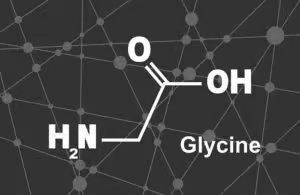Table of Contents
Glycine (2-Aminoacetic Acid, Gly, G) is a conditionally essential amino acid and neurotransmitter. The simplest of all amino acids, glycine plays a role in the synthesis of nucleic acids, glutathione, RNA and DNA, and creatine.[i]
Glycine is synthesized in your body from threonine (through threonine dehydrogenase pathway), choline (via formation of sarcosine), and serine (through serine hydroxy methyltransferase [SHMT]).[ii]
Glycine is considered a “conditionally essential” amino acid because your body cannot produce enough on its own. So, the remainder must be obtained from foods like meat, fish, dairy, legumes, or supplements.[iii]
Glycine plays a critical role as a neurotransmitter because it controls your intake of food, behavior, and complete body homeostasis.
It can be both excitatory and inhibitory. Which means that it can stimulate your brain and nervous system, as well as quieten it.
Supplementing with glycine has been shown to effective in treating metabolic disorders, inflammatory disease, obesity, cancers, and diabetes.
Here we’ll investigate as a nootropic for enhancing sleep quality and brain function.
Glycine helps:
- Sleep: Glycine helps you fall asleep more quickly, reduce insomnia, improve sleep quality, and promote deeper and more restful sleep
- Neurological disorders: Glycine has been shown to be effective in those dealing with schizophrenia, OCD, and depression.
- Stroke: Patients who have suffered ischemic stroke (brain ischemia or cerebral ischemia), are given glycine orally to help limit damage to the brain within the first six hours of the stroke.
Overview
Glycine (2-Aminoacetic Acid, Gly, G) is one of the most important amino acids in your body. It helps in regulation of cardiovascular, cognitive, and metabolic health.
 The name Glycine comes from the Greek word γλυκύς “sweet tasting“.
The name Glycine comes from the Greek word γλυκύς “sweet tasting“.
Glycine was discovered in 1829 by French chemist Henri Braconnot after boiling gelatin with sulphuric acid. And since then, it has been manufactured and distributed commercially as a sweetener, and as a buffering agent for antacids.
Glycine is also a sweet and colorless crystal that is synthesized in your body from choline, threonine, and serine.
As a therapeutic and nootropic supplement provides multiple benefits to human health.
Glycine has been shown to be effective for improving skin elasticity. And collagen peptide which is loaded with Glycine helps suppress sun-induced skin damage and reduce wrinkles around the eyes.[iv]
Glycine supplementation helps reduce the symptoms of schizophrenia.[v] It helps reduce symptoms of OCD. And low blood levels of glycine have been associated with depression.
Numerous studies have also shown glycine’s potential in improving sleep, enhancing memory, and increasing insulin sensitivity.
Glycine modulates inhibitory neurotransmitters via glycine receptors throughout the central nervous system.[vi] And potentiates NMDA receptors which provides an excitatory response.[vii] Affecting cognition, mood, immune function, and sleep.
How does Glycine work in the brain?
Glycine boosts brain health and function in several ways. But two in particular stand out.
- For sleep – Numerous studies have shown that glycine influences the quality of sleep, reduces insomnia, and promotes restful sleep. It does this in a couple of ways.
Glycine has a particular affinity for NMDA receptors and glycine receptors. Which results in increased peripheral blood flow, and a subsequent drop in the core body temperature.
In other words, glycine works to improve blood flow to the body’s extremities, which in turn reduces core body temperature.
This decrease in body temperature plays an important part of sleep induction since the onset of sleep is associated with lowered body temperature. Which then progresses to deep sleep.
Researchers demonstrated this in an animal study showing how glycine triggered a drop in body temperature which helped the study subjects fall asleep more quickly And spend more time in REM sleep. [viii]
The study also showed that glycine can help you experience deep, slow wave sleep more quickly.
Glycine has also been shown to increase the production of serotonin in the brain. Which helps sleep because serotonin aids in the synthesis of the sleep hormone melatonin.[ix]
Studies also suggest that glycine can help you get back to your regular sleep cycles after a period of a disrupted sleep schedule.[x]
- Schizophrenia – Glycine has shown promising results in reducing the symptoms of depression, OCD, anxiety, and bipolar disorder. However, its most pronounced efficacy is seen in the reduction of schizophrenia symptoms.
Post mortem evaluations of the brains of people with schizophrenia have shown fewer NMDA receptors compared to those who did not have the disease.
Researchers also found decreased levels of glycine in both the blood and cerebrospinal fluid of people with schizophrenia.[xi]
Glycine is known to be an NMDA agonist. It is well tolerated by the patients in both short-, and long-term treatment.
To date, numerous studies have been conducted to evaluate the efficacy of glycine in treating schizophrenia.
The first controlled trial used a glycine dose of 15 grams per day which showed significant improvement during glycine treatment.
Another study, 21 schizophrenic patients were given high doses of glycine in addition to antipsychotic treatment.
A significant 34% reduction in negative symptoms was observed during glycine treatment. And the study authors noted the improvement persisted even after patients stopped supplementing with glycine. [xii]
 How things go bad
How things go bad
Sleep deprivation or the inability to get a good night’s sleep is an increasing concern world-wide. Not enough sleep or poor sleep quality can result in:
↓ Memory loss
↓ Inability to concentrate
↓ Poor metabolism
↑ Weight gain
↑ Irritability
↑ High blood pressure
↑ High blood sugar levels
↓ Low sex drive
↑ Risk of heart disease
Glycine as a nootropic supplement helps the body make serotonin which improves sleep and mood. And it influences key receptors in the brain resulting in better learning and memory.[xiii] [xiv]
Low glycine levels in the body are also linked to depression.[xv]
 Glycine benefits
Glycine benefits
Glycine activates NMDA receptors in the brain and restores serotonin levels which helps improve sleep. And the ability to fall asleep faster.
In one study, 15 adult females were given either a placebo or 3 grams of glycine before bed.
The study concluded that supplementing with glycine showed a significant improvement in reduced fatigue, liveliness, and clear-headedness the next morning.[xvi]
Glycine helps brain cell signaling which boosts cognition, memory and mood.
Glycine taken in high doses has proven to be highly effective in reducing the symptoms of schizophrenia.
It helps with depression and mental fluency associated with schizophrenia.
And may improve psychotic symptoms as well.[xvii]
Evidence also suggests that glycine assists with depression and neurodegenerative diseases such as Alzheimer’s and Huntington’s.
Glycine also showed a protective effect against neurological damage associated with stroke.[xviii]
And research suggests improvements in memory, recall, and sustained attention in those supplementing with glycine as a nootropic.
How does Glycine feel?
People who take high quality glycine supplements report better sleep quality, and improved mood during the day.
Some users say they felt more balanced and livelier once they started supplementing with glycine.
Glycine is best taken 60 minutes before bed. Most users report a minimum of 7 hours of undisturbed, high quality sleep.
Glycine helps even chronic insomniacs fall asleep easily.
Unlike most sleep inducers, glycine does not leave you feeling groggy and fatigued in the morning. On the contrary, users wake up feeling rested and ready to tackle the day.
Glycine is a good joint health supplement. Because it aids in cartilage regeneration by enhancing collagen re-synthesis.
Glycine may also provide relief from night sweats for pre-menopausal and menopausal women.
 Glycine Clinical Research
Glycine Clinical Research
Glycine for schizophrenia
22 schizophrenic patients who were treatment-resistant took part in a double blind, placebo-controlled trial. They were administered 0.8g/kg per day of glycine along with their antipsychotic medication.
Clinical assessments were performed bi-weekly. The group who was administered glycine showed a 24-46% reduction in negative symptoms. [xix]
In another double-blind, placebo-controlled study, 14 medicated patients with chronic schizophrenia were treated with glycine. The results showed a significant improvement in negative symptoms in the group that was given glycine but not in the group given placebo. [xx]
Glycine for sleep
In a randomized placebo-controlled trial, 11 healthy adults were given either 3 grams of glycine or a placebo 1 hour before bed for 2 days. The results indicated quicker sleep onset followed by long, restful sleep.[xxi]
In 2012, another placebo-controlled study recruited healthy adults who were restricted to 25% less sleep than normal. Study subjects were given either a placebo or 3 grams of glycine before bed.
In subjects given glycine, the data showed a significant reduction in fatigue often related to reduced sleep.[xxii]
Glycine for learning and memory
Scientists studied the effects of bioglycin, a biologically active form of glycine in healthy students (mean age 20.7 years), and middle-aged men (mean age, 58.9 years).
The researchers specifically measured attention, memory, and mood using a double-blind, randomized design. [xxiii]
The results indicated that bioglycin significantly improved episodic memory in both the young and middle-aged group. And the middle-aged group also showed a significant improvement in the sustained-attention task.
Glycine Recommended Dosage
 Recommended nootropic dosage of Glycine is 3 grams per day.
Recommended nootropic dosage of Glycine is 3 grams per day.
Experts recommend a Glycine dosage of 0.4 grams per kilogram of body weight (g/kg) twice daily when taking an atypical antipsychotic like Zyprexa and Risperdal.
Many human trials have safely used glycine doses of 1 g (1000 mg) per day for supporting brain health after a stroke. And up to 50 grams per day for schizophrenia.
Most Glycine supplements come in 1000 mg capsules. And the most effective dose is reported to be 3 grams 60 minutes before bed.
Glycine Side Effects
Glycine supplements are generally considered non-toxic and safe with few side effects in most people.
However, supplementing with 9 grams or more of Glycine may result in mild gastrointestinal symptoms such as an upset stomach, nausea, loose stools, or vomiting.
Slight sedation is also a possible side effect of taking glycine.
Do not take glycine if you are on the antipsychotic drug Clozaril (clozapine). Unlike other drugs used to treat schizophrenia, glycine appears to decrease the effectiveness of Clozaril in some people.[xxiv]
Do not use glycine if you are suffering from diarrhea, as it may worsen the condition.
Due to lack of sufficient research, glycine should be avoided by breastfeeding and pregnant women unless prescribed by a physician.
Type of Glycine to Buy
Glycine is available in 1000 mg capsules, 500 mg tablets, and as powder.
Look for a Glycine supplement with zero “other ingredients”.
Avoid Glycine supplements containing additives such as silicon dioxide, stearic acid, or magnesium stearate.
I recommend: Click for Life Extension – Glycine because it is pure.
Nootropics Expert® Recommendation
I recommend Glycine as a nootropic supplement.
Your body makes some Glycine during the day. But you need more Glycine than your body can produce on its own. So, you must get it from food or a nootropic supplement.
Glycine is particularly effective in those dealing with sleep disorders or insomnia.
Supplementing with Glycine should provide a good night’s sleep. And have you feeling well-rested the next morning.
Glycine has been shown to be effective in those dealing with schizophrenia. Even while using most regular medications used with this disorder.
But please, if you are dealing with schizophrenia, check with your doctor before using this nootropic.
Glycine as a nootropic supplement used at recommended dosages is non-toxic and safe for most people with little or no side effects.
3 grams of Glycine seems to be most effective for most people taken about 60 minutes before bed.
I recommend: Click for Life Extension – Glycine because it is pure.








Join The Discussion - 152 comments
Serge
February 26, 2021
Hello David
Does glycine has effect on prolactin?
Thanks
David Tomen
February 26, 2021
According to several animal studies, no it does not: https://pubmed.ncbi.nlm.nih.gov/6402274/
Andrew
February 24, 2021
How is this stack
Looking to take this Glycine 1000MG also Acetyl-L-carnitine 500MG and PQQ 10Mg, and DHA 500MG and Magnesium at 400MG and Vit D 2000UI per day
can I take all this in one stack okay!
Thanks
David Tomen
February 25, 2021
Andrew, you could take it all at once. Buy Glycine and magnesium are typically used before bed. Because they help sleep.
ALCAR and PQQ help produce energy in mitochondria. Which you need during the day. So those would be morning and noon.
And DHA (double your dose BTW) supports brain cell membrane health. And can be a bit of a stimulant. So better to use it in the morning. Same with Vitamin D.
Andrew
February 25, 2021
additives such as silicon dioxide, stearic acid, or magnesium stearate are in a lot of the supplements and the ones I have, is a major issue? or just better without them for quality reason is it going to affect the quality of the stuff I take working correctly? why do they put them in the products?
David Tomen
February 26, 2021
Andrew, most of these additives are toxic and are there to benefit the manufacturer. And not you. They use them to help prevent powders from clumping or clogging encapsulation machines, to add color or make the supplement smell better, as a preservative or to fill up the remainder of the capsule.
I have a section in this article that explains it in more detail: https://nootropicsexpert.com/7-tips-for-choosing-the-highest-quality-nootropic-supplements/
It is not necessary to use these toxic “other ingredients”. And the proof is companies like Performance Lab and Mind Lab Pro who produce their supplements without them.
Enzo
February 15, 2021
Hello David.
I take 1.2g of NAC everyday and I want to start with Glycine. Should I take 3g of Glycine before bed? What time do you think I should take NAC, between the meals with an empty stomach, or together with Glycine before sleep?
Thanks a lot.
David Tomen
February 16, 2021
Enzo, I like taking NAC 3-times per day; morning, noon and 4 pm because it supports dopamine receptors. Then Glycine about 60 mins. before bed for sleep.
Take NAC with or without food but if using long-term consider taking 30 mg zinc and 1.5 mg copper because one study showed NAC long-term depleted zinc.
Enzo
February 17, 2021
Nice David.
The daily dosage for Glycine is 3g? Or can I take 1g per day and have good results?
Is Glycine important to the production of glutathione in the body like the NAC is?
Thanks for all the replies.
David Tomen
February 18, 2021
Enzo, try 1 gm and see if it works for you.
NAC contains Cysteine which is the rate limiting step in glutathione production. And Glycine is a cofactor in its synthesis.
Katy
October 15, 2021
I’m really enjoying reading your web page, very informative! I’m curious if you need to take both NAC and Glutathione? I have been using both of and on since the pandemic…Do I need both?
Thanks
David Tomen
October 15, 2021
Katy, great question and the answer is yes it is helpful to use both NAC and Glutathione. Because some areas of your brain use NAC and others prefer glutathione.
Jozef
February 11, 2021
Hi David, is the combination of glycine and tryptophan good? Is there a risk of serotonin syndrome? Thank you
David Tomen
February 11, 2021
Jozef, I use both before bed and it works for me. It’s certainly safe and there is no chance of Serotonin Syndrome unless you are also using a prescription SSRI or something like St. John’s wort.
Flavio
December 10, 2020
hello David, I would like to know How many MG of Inositol do you consume per day? and if 25 ml as Performance Lab® NutriGenesis Multi states on its label is it enough per day according to your experience?
I would also like to know, please, what you mentioned about our body and brain can only use 10 – 20 mg of Panthetihine per day and excess is eliminated in your urine.
being so with 20 Mg per day is enough according to your opinion?
David Tomen
December 10, 2020
Flavio, the recommended dosage for inositol is up to 3 grams per day. Typically split into 3-doses of 1 gram each. But that is if you are using to to deal with a specific problem like OCD, depression, or panic attacks.
If you have no specific goal in mind then the amount in Performance Lab Multi is enough for maintenance.
Same thing with Vitamin B5 where the recommended daily dose if 5 mg per day. Unless you are working on a specific problem. Then you’d use much higher doses.
Larry Ward
December 8, 2020
David: I have taking 900 mg of lithium carbonate daily for more than 20 yr. How much Lithium Oritate would I have to take to wean myself off of iT?
Thanks,
Larry Ward
David Tomen
December 10, 2020
Larry, it depends on your unique system. But I’ve heard of people that used to be on high dose lithium meds who were able to manage their symptoms with 5 – 10 mg Lithium Orotate 3-times per day.
Amy Lo
December 8, 2020
Hi Mr Tomen,
Ask glycine tastes quite sweet, if I take 3000 mg every night before bed, will it cause diabetes?
David Tomen
December 10, 2020
Amy, Glycine is not a sugar. It’s an amino acid. So no it won’t “cause diabetes”.
Sofia Francesca
December 1, 2020
THANKS for all the information that you gave us all Mr. David.
What a great stress relief neurotransmitter, I think I will give it a try! do you think I should add it on weekends? Im currently studying for a heavy exam for next month. Im poor, so I build my own stack:
Modafinil 80 mg 5-day week (Mostly for attention and motivation)
Ginkgo Biloba 200 mg daily (blood circulation in the brain and)
Curcumin+black pepper 18 mg daily
Ashwagandha daily
Indian Ginseng daily
Lemon balm (Do you think this can interfere with Modafinil?) daily
chamomile (and this one too?) daily
L-Theanine daily
Camellia Sinensis daily
Soy Lecithin 48 mg daily
Nootropex daily, Chilean stack, 2 capsules in a day and each capsule has:
Caffeine
Green tea (I also take my own Green tea through the day, 3 or 4 cups)
Guarana
CDP-Cholin 200 mg
L-Tirosine
B- complex ( B1 , B2, B3, B5, B6, B9 y B12)
So, do you think is too much? Should I delete something? and finally, do you think it is a good idea to add Glycine on weekends?
David Tomen
December 2, 2020
Sofia, use Glycine only if you think you need it. Before bed is best if you decide to try it.
The only thing about your stack is are you supporting Modafinil use enough? And that means is there enough L-Tyrosine in that supplement you are using?
And Curcumin is usually used 750 mg 3-times per day. If you are using only 18 mg per day I don’t see any benefit.
Sofia Francesca
December 2, 2020
Im very glad that you answer me! thanks you. What do you mean by enough L-Tyrosine, hows that related with Modafinil? and by the way, my final exam is on 5 January, Do you think its worth money and time for Piracetam+Citicoline? do you think it will work? I mean people often say that piracetam take time for the real benefits. So, would you recommend me Piracetam+Citicoline for 34 days of heavy studying?
David Tomen
December 4, 2020
Sofia, Piracetam + Citicoline is likely worth the money if 34 days of “heavy studying” is important to you.